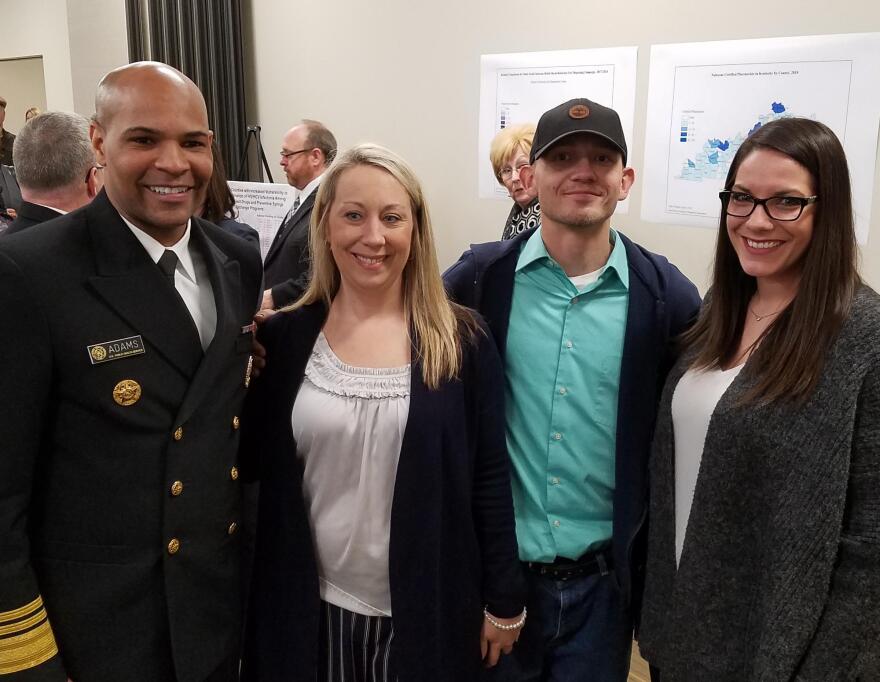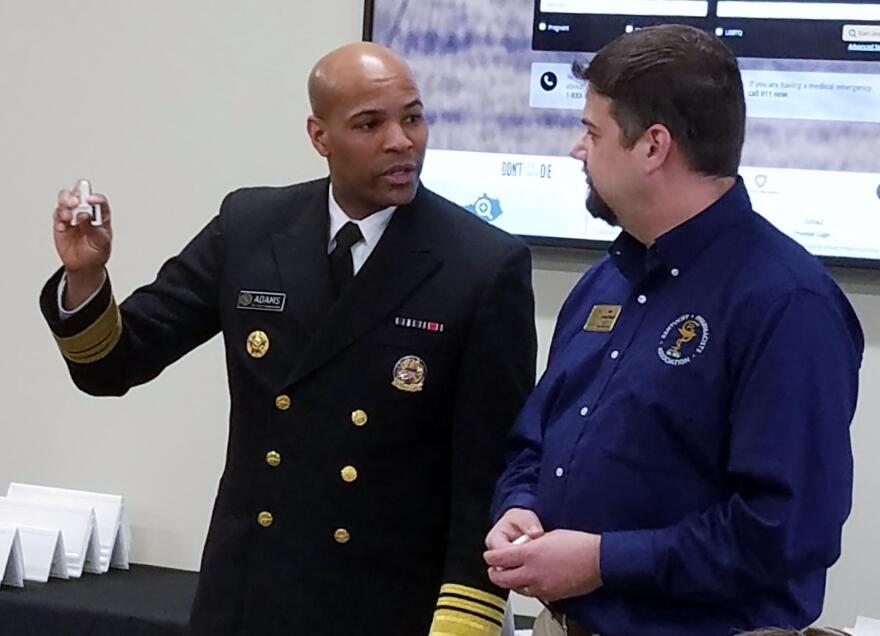No one in Kentucky is more than one person removed from the opioid epidemic, according to state health officials meeting Monday with U.S. Surgeon General Dr. Jerome Adams. The visit comes just days after Adams' call for more people to carry the overdose reversal drug naloxone.
"Over three-quarters of people who have commercial insurance can get naloxone at no cost or at a copay of $20 or less," Adams says. "So, if you have commercial insurance, 95 percent of folks are covered at low or no copay." He says President Donald Trump is "leaning into" the issue to provide funding for states to make the drug available to those without insurance coverage.
Kentucky's "Good Samaritan Law" protects people who administer naloxone to someone who is overdosing, says Jody Jaggers, PharmD, director of pharmacy emergency preparedness with the Kentucky Pharmacists Association.
A Recovery Story
Travis Schwab's story starts the same as many people who are in recovery. He was fighting a battle with depression and started using pain pills to make himself feel better. "Pain pills were my medicine," he says. When it became harder to get the pills, he turned to heroin, which he found cheaper and a lot stronger. Schwab estimates Narcan (the brand name for naloxone) saved his life four or five times.
Now, he's in recovery, "I'm an addict and always will be," he says matter-of-factly. He's also in college working on a degree in human services, though he isn't certain that's what he ultimately wants to do.
"A lot of people say that addicts who keep getting brought back with Narcan deserve to die -- in fact, my cab driver told me that this morning -- but these are people's dads, moms, brothers and sisters, and they need their fifth and sixth chances, too."

Dealing With The Epidemic
The commonwealth is one of just two states with a mobile pharmacy unit that travels the state dispensing naloxone and training people on how to administer the nasal spray. While touring the unit, Adams suggested administering naloxone isn't the end of the conversation, it's the beginning, and he's asking the medical community to "step up."
"We know we will never have enough in-patient recovery centers; we will never have enough people trained in addiction medicine to dig ourselves out of this problem," he says. "But we know that if we arm every doctor, every nurse, every pharmacist with the tools to at least be able to recognize who is at risk and to be able to intervene or to refer where appropriate, we will be in much better shape."
Adams said he understands the challenge of reviving the same people over and over again.
“I get the frustration amongst folks about continuing to resuscitate individuals. I have asthma. I have had to be resuscitated several times in my life. I’m very glad no one gave up on me,” said Adams.
During a visit to the Northern Kentucky Health Department, Adams reiterated a need to see opioid addiction as a chronic illness, and share intervention programs that are evidence based. He admits infectious diseases like HIV and hepatitis C are a component of the opioid epidemic that needs addressing as well. To that end, he praises Kentucky's various needle exchange programs.
The number of needle exchanges has grown in much of the Ohio Valley, especially Kentucky. Other communities, such as Charleston, West Virginia, are pushing against such measures amid complaints about cost and repeated emergency overdose calls draining resources.
Adams is encouraged to see doctors are doing a better job of not overprescribing opioid drugs. However, he says, the opioid epidemic has many levels.
"Once we crack down on prescribing, we know that folks will shift over to heroin (and fentanyl)... It's really why we need to move upstream and deal with the proximate causes, have a focus on prevention, deal with adverse childhood experiences, deal with mental health issues, and make sure we're using the opioid epidemic as an opportunity to change the way we talk about health, to change the way we talk about mental health, to change the way we talk about addiction and create whole and healthy communities."





